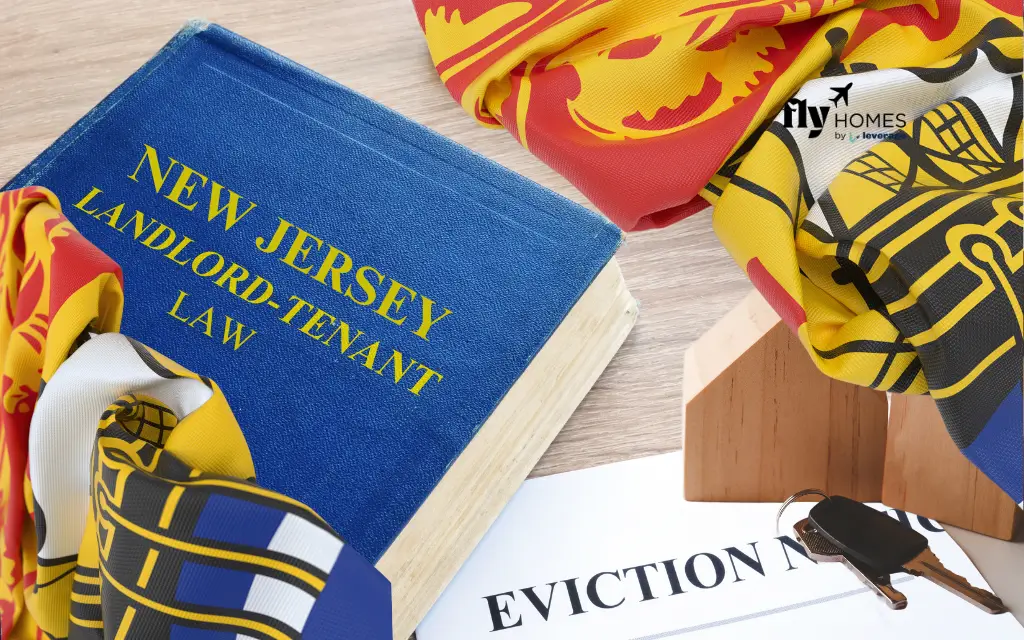The relationship between landlords and tenants in New Jersey is governed by a set of rules and regulations designed to ensure fairness for both parties. However, NJ Landlord Tenant Law can be complex, but don’t worry—you’re in the right place!
This blog will break down all the key details of NJ Landlord Tenant Law, including payment clauses, rights, responsibilities, and legal protections for both landlords and tenants. Stay with us to explore the latest updates and legal aspects of NJ Landlord Tenant Law 2025
Table of contents
What is NJ Landlord Tenant Law?
New Jersey or NJ landlord tenant laws are designed to regulate the rental process comprehensively, covering everything from initial agreements to eviction procedures. The New Jersey Department of Community Affairs (DCA) offers extensive resources to assist both landlords and tenants in understanding these regulations.
A NJ lease agreement can be either oral or written. However, a written lease is highly recommended as it clearly outlines the responsibilities and expectations of both parties. According to NJ Landlord Tenant Law a practical guide leases exceeding one year, a written and signed agreement is mandatory. The lease should detail the rental amount, due date, lease term, and any other specific terms agreed upon.
Key Components of a Lease Agreement Under NJ Landlord Tenant Law
Whether written or oral, a tenancy agreements must clearly define the rental terms and responsibilities of both the landlord and the tenant. Here are the primary components that is included in NJ Landlord Tenant Law:
- Rental Amount: The agreed-upon rent payment and frequency (monthly, quarterly, etc.).
- Due Date: When the rent is expected to be paid each month.
- Lease Term: The length of time the lease agreement will be in effect, including start and end dates.
- Specific Terms: Any other terms agreed upon by both parties, such as maintenance responsibilities, rules on pets, or restrictions on subletting.
Payment Clauses Under NJ Landlord Tenant Law
As per the NJ Landlord Tenant Law, there is no specified rent and landlord can charge any amount of rent that is appropriate and suitable for the property. Also, there is no state-wide limit on the amount of rent to be paid by the tenants under NJ Landlord Tenant Law.
Rent Control Policies
As per NJ Landlord Tenant Law, local jurisdictions are allowed to formulate policies for rent control in their area. And, this is the reason why, there are almost over 100+ municipalities having their own rent control policies. Rent control laws vary by municipality, so it is crucial for both landlords and tenants to understand the local regulations. Always be sure to check out the rent control policies of the area you are choosing your home in.
Rent Increases and Notices Under NJ Landlord Tenant Law
Under NJ Landlord Tenant Law, landlords are required to give written notice before increasing rent, with specific notice periods depending on the lease type. Tenants should be aware of local ordinances that may impose rent control limits on increases.
- Written Notice Requirement: Landlords must provide written notice before increasing rent.
- Notice Period: Varies based on lease length and local ordinances.
- Month-to-Month Lease: Typically requires a 30-day notice.
- Rent Control Regulations: Some municipalities enforce rent control laws, limiting rent increase frequency and amount.
- Local Ordinances Compliance: Always check local laws for specific rent regulations.
Security Deposits as per NJ Landlord Tenant Law
Under NJ Landlord-Tenant Law, security deposits are regulated to ensure fairness between landlords and tenants. Here’s an overview of the rules surrounding NJ security deposit law.
- Maximum Deposit Limit: Cannot exceed 1.5 times the monthly rent.
- Exception: Rule does not apply to rental properties with fewer than two units.
- Security Deposit Refund Timeline:
- Standard Return: Within 30 days of tenant vacating the premises.
- Emergency Situations (Fire, Flood, Evacuation): Refund must be issued within 5 days.
- Domestic Violence Cases: Tenant must receive a refund within 15 days upon providing valid proof.
- Deductions: Landlords can deduct for damages beyond normal wear and tear.
By following NJ Landlord Tenant Law, both landlords and tenants can ensure fair housing practices and legal compliance.
Further Read: Feeling overwhelmed by California’s rental rules? Check out our student-friendly guide to California landlord-tenant laws and get the essential tips for your lease with ease!
Rights and Responsibilities of Landlords and Tenants Under NJ Landlord Tenant Law
Under NJ Landlord-Tenant Law, both landlords and tenants have specific responsibilities to ensure a fair and lawful rental relationship. This includes property maintenance, timely rent payment, and adherence to lease terms and local regulations.
Landlord Responsibilities Under NJ Landlord Tenant Law
As a landlord in New Jersey, it’s essential to understand your legal responsibilities to maintain a positive and compliant rental experience. NJ Landlord Tenant Law outlines specific duties that landlords must uphold, from property maintenance to ensuring a safe and habitable living environment for tenants.
Here are the landlord responsibilities under NJ Landlord Tenant Law:
- Property Maintenance: Must keep rental properties in a habitable condition, ensuring safety, sanitation, and compliance with building codes.
- Entry Notice Requirement:
- Standard Notice: Must provide at least 24 hours’ notice before entering a tenant’s unit.
- Emergency Situations: Can enter without prior notice if urgent.
Tenant Rights and Responsibilities Under NJ Landlord Tenant Law
Under New Jersey’s Landlord Tenant Law, tenants have specific rights that protect them from unfair treatment and ensure a safe, habitable living environment. At the same time, tenants have certain responsibilities to uphold, including paying rent on time and maintaining the rental property. Here are the tenant rights and responsibilities under NJ Landlord Tenant Law:
- Right to Request Repairs: Tenants can request repairs for issues that impact habitability.
- Withholding Rent: If landlords fail to make repairs, tenants may have the right to:
- Withhold rent until repairs are completed.
- Make repairs themselves and deduct costs from rent.
- Repair Timeline: NJ Landlord Tenant Law does not specify a time frame for landlords to complete repairs.
By understanding these rights and responsibilities, both landlords and tenants can maintain a fair and legal rental agreement.
Eviction and Termination Under NJ Landlord Tenant Law
Eviction under NJ Landlord-Tenant Law follows a legal process to ensure fairness for both landlords and tenants. This includes issuing a Notice to Quit and allowing tenants the opportunity to contest eviction in court.
Grounds for Eviction
- Non-Payment of Rent: Tenants can be evicted for failing to pay rent.
- Lease Violations: Any breach of lease terms can be grounds for eviction.
- Illegal Activities: Engaging in unlawful activities on the rental property may lead to eviction.
Eviction Process
- Notice to Quit:
- Landlords must issue a formal notice specifying the reason for eviction.
- Tenants may have the opportunity to remedy the violation before further legal action.
- Filing an Eviction Complaint:
- If the issue is unresolved, landlords must file an eviction complaint in court.
- Tenant Rights in Eviction Cases:
- Tenants have the right to contest the eviction in court.
- Both parties present their case during a court hearing before a final decision is made.
Understanding NJ eviction laws ensures compliance with legal procedures and protects tenant rights.
Recommended Read: Ready to know the ins and outs of student accommodation in the Lone Star State? Check out our ultimate guide to Texas landlord-tenant laws.
FAQs on NJ Landlord Tenant Law
As per NJ Landlord Tenant Law, the maximum security deposit a landlord can charge is one and a half times the monthly rent.
A landlord must return a tenant’s security deposit within 30 days after the tenant vacates the rental property as specified in the NJ Landlord Tenant Law. The landlord can deduct amounts for damages beyond normal wear and tear but must provide an list of deductions.
As per the NJ Landlord Tenant Law, landlords must provide tenants with reasonable notice before entering their apartment. Typically, this notice is at least 24 hours, except in emergencies where immediate entry is necessary.
Rent control laws in NJ Landlord Tenant Law vary by municipality. Some cities have rent control regulations that limit the amount and frequency of rent increases. Tenants and landlords should check local ordinances for specific rules in their area.
A written lease is required for rental agreements longer than one year. For rental agreements of one year or less, an oral lease is legally binding, though a written lease is recommended to clarify terms and avoid disputes.
Tenants have the right to a safe and habitable living space, protection from illegal eviction, and privacy. They can also request necessary repairs and expect fair treatment under the law.
No, landlords must provide proper written notice before increasing rent. For month-to-month leases, a 30-day notice is typically required. Some municipalities have rent control laws that regulate increases.
Yes, tenants may withhold rent if the landlord fails to make essential repairs. Alternatively, they may pay for repairs themselves and deduct the cost from their rent. However, legal guidance is recommended before doing so.
Fixed-term leases: No notice is required unless the lease specifies.
Month-to-month leases: Tenants or landlords must give a 30-day written notice to terminate.
Landlords must provide at least 24 hours’ notice before entering a rental unit unless there’s an emergency like a fire or gas leak.
Yes, landlords must ensure heat, water, and essential utilities are available unless the lease states the tenant is responsible for utilities.
Under the New Jersey Fair Housing Act, landlords cannot discriminate based on race, gender, disability, religion, or source of income (such as housing vouchers).
According to NJ Landlord Tenant law, tenants can file complaints with the New Jersey Department of Community Affairs (DCA) or seek legal assistance if their rights are violated.
These FAQs help tenants and landlords understand their rights, responsibilities, and legal protections under NJ Landlord-Tenant Law
Hope you liked reading about NJ Landlord Tenant Law. For a stress-free stay during your study abroad adventure, choose Fly Homes. Call 1800572118 to reserve your ideal student accommodation abroad with ease.
Follow Us on Social Media




























